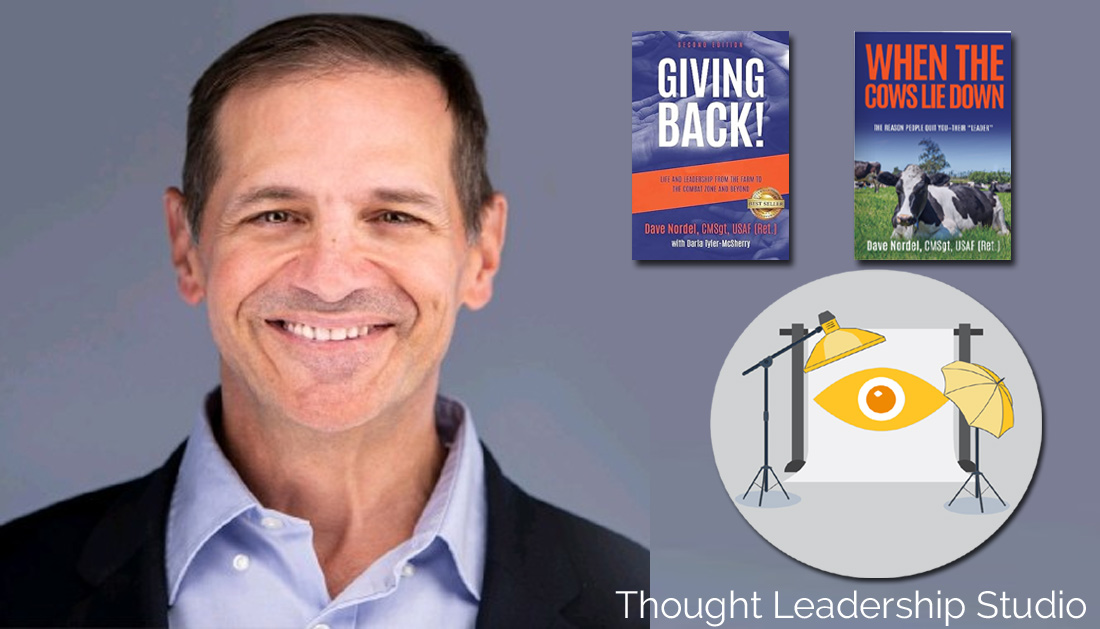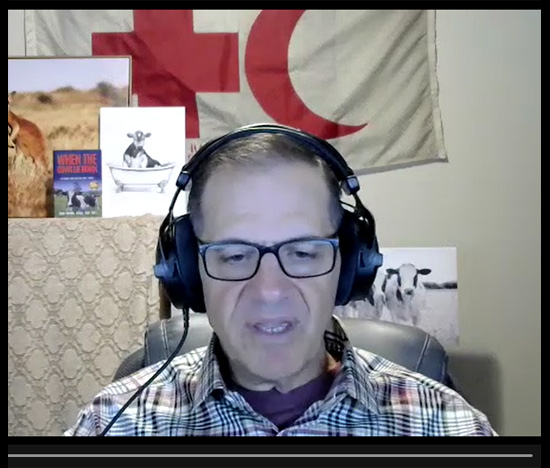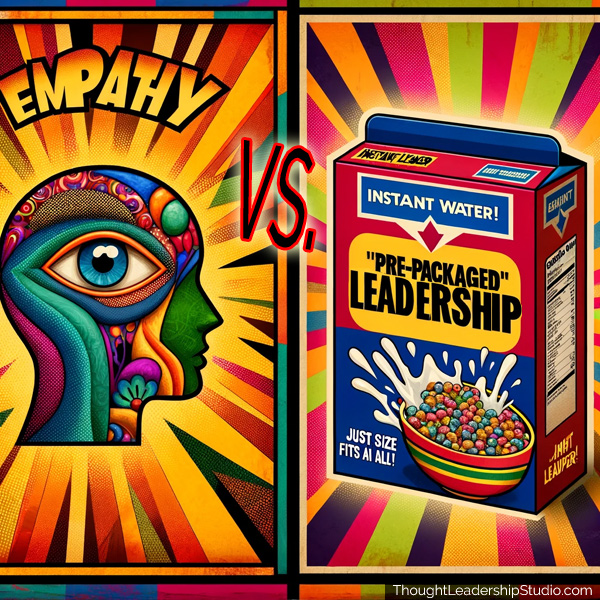Thought Leadership Studio Podcast Episodes:
Are Your Cows Lying Down? David Nordel on What Leaders Need to Notice
Episode 59 - Author and Leadership Consultant David Nordel Discusses his New Book and Why and How to Notice Signs of Change Early

#authors, #consulting, #inspiration, #interviews, #leadership, #motivation, #storytelling, #thoughtleadershipexamples
Or Click here to listen or subscribe on appWhat this episode will do for you
- Recognize Subtle Signs of Change: Learn from Dave Nordel’s approach on how leaders can proactively notice and respond to early signs of change in their environment.
- Empathy in Leadership: Discover the importance of deep empathy in leadership, as opposed to relying on pre-packaged, generic leadership advice.
- Slowing Down to Go Faster: Understand Nordel’s principle of "slowing down to go faster" in leadership, focusing on quality interactions and thoughtful decision-making.
- Building a Life Team: Gain insights into the concept of building a life team for personal and professional support, understanding the value of collective wisdom and shared experiences.
- Max Fab Mindset: Explore the 'Max Fab' (Maximum Fabulous) mindset for maintaining a positive attitude and resilience through challenges, as shared by Nordel.
- Storytelling for Impact: Learn the power of storytelling in communication and leadership, drawing on Nordel’s experiences and narrative techniques.
Dave Nordel.
In this episode, I have my second interview with the inspiring Dave Nordel, author and the founder of MaxFab Consulting, this time discussing his approach to getting leaders to proactively notice signs of change and his new book, "When the Cows Lie Down." Nordel emphasizes the importance of empathy, human connection, and slowing down to go faster in leadership. He believes that leadership is a hard skill that directly affects the quality and safety of a product or service.
Nordel also discusses the concept of "Max Fab," which stands for maximum fabulous, and how it relates to maintaining a positive attitude and pushing through challenges. He encourages listeners to evaluate their boundaries, choose their life team wisely, and practice active listening.
Some of Dave's coordinates:
Curated Transcript of Interview with Dave Nordel
The following partial transcript is lightly edited for clarity - the full interview is on audio. Click here to listen.
Chris McNeil: I'm Chris McNeil, with Thought Leadership Studio, and I'm sitting here across a couple of time zones with Dave Nordel, who was here a year ago talking about his book Giving Back, and now he's got a new book when the Cows Lie Down and he's the founder of Max Fab Consulting, as well as being just a great overall value centered leader. Great to have you back, Dave.
 Dave Nordel: Hey Chris. Thanks. Yeah. For the listeners, Chris and I probably did half the show just before we hit the record button, so we are going to probably recreate that, which is a lot of fun. I really, I appreciate you Chris, one, consuming the stuff I've written, giving some feedback, and then telling me a chapter or two that you hone in on.
Dave Nordel: Hey Chris. Thanks. Yeah. For the listeners, Chris and I probably did half the show just before we hit the record button, so we are going to probably recreate that, which is a lot of fun. I really, I appreciate you Chris, one, consuming the stuff I've written, giving some feedback, and then telling me a chapter or two that you hone in on.
Because what you do globally for people helps guide me on how I take my approach with folks I think with you and some of it, it's groupthink because we're passionate about the same things, but our way that we weave our way through it and the avenues that we run in are different enough that you're a big help to me. So this is great. Show's great. What you're doing is great. So onward, right.
Chris McNeil: I appreciate you very much and your books are inspiring to me. And I had some notes of things I wanted to bring up that they inspired me to ask. And we'll get to those.
Empathy Vs. Pre-Packaged Leadership Advice
But that little conversation we had before hitting the record button about how, seems like there might be a generation or two that has been fed prepackaged leadership advice and forgot about the deep empathy that really comes from.
 Dave Nordel: Right. So I think there's a couple things we'll continue where we left off and get back to, I think there's a couple things there, and I like that prepackaged leadership. I think pre COVID, our whole society was prepackaged, like I explained, a cup of coffee and an egg McMuffin and off to work and that is so comfortable and has no fear and pain involved with it.
Dave Nordel: Right. So I think there's a couple things we'll continue where we left off and get back to, I think there's a couple things there, and I like that prepackaged leadership. I think pre COVID, our whole society was prepackaged, like I explained, a cup of coffee and an egg McMuffin and off to work and that is so comfortable and has no fear and pain involved with it.
The outcome where you're going and you're out of the next thing, your hunger and your need for coffee is satisfied and you're off to work in your next set of challenges and you would like everything to be scripted that way.
And I think in a lot of ways when we stepped away from deliberately developing people, we have, when we started to call those soft skills, which directly shaved off growth and development of people in our sphere of influence, shaved it off from being attached directly to whatever our product is that can be manufacturing, can be healthcare, whatever you want it to be.
We had a product and that was always in line, perfectly in line with development of the next generation, next person up. Knowledge is power only when shared as I write, right. Passing on those things, we shaved that off and called it soft because it costs. And as we started to do the money equation, we shaved off this leadership piece and called it soft skills and soft needs. And then when we ran our big calculator on the bottom line, we said, well, we're probably going to sacrifice this at the expense of the product line.
Slowing Down to Go Faster
Well now we're starting to pay the price for that I think because now you have people that, what are the numbers? I preach 'em all the time. You start leading another human being at the age of 30, maybe the second most responsible thing you do, most critical thing you do in your life short of raising children at 39, you get a job where you're leading people, leading people and at 42 somebody decides you need your first formal leadership development. That just seems inverse to me. And so as we're working through this, we got to push this back. We got to push this back to understanding that leadership, empathy, caring, human connection, slowing down to go faster, which means spending time with people is actually a hard skill and it actually does directly affect quality, safety, the quality of your consumer's perception of your product and your reputation.
Chris McNeil: Absolutely. And slowing down to speed up is a principle I know well from guitar - and I like to play fast. I am a child of the eighties in some ways, although I'm originate in the sixties, but I grew up during the shredder era, Eddie Van Halen and so forth, and I could play fast but not clean until I worked with a guy who was a really adept jazz guitarist. So he is like, "You've got to slow down to speed up. You got to train your motor movements consciously and go super slow. Then you clean up all that extraneous, wasted lack of economy of motion where your fingers are just flailing and then gradually bring the speed in from that." And that was an important lesson.
Dave Nordel: I love it. But was it easy?
Chris McNeil: Of course not. But that was the satisfying part.
Dave Nordel: Well, exactly. So this is the dynamic that we have to change because this is human nature. This is not throwing rocks at people are saying that they're weak or they can't do things. Human nature is just like water. I call water the most boring thing in the world. It takes the path of least resistance and it never gets to do the hard stuff, right? Water doesn't run uphill.
 So what we've got to get people to understand is there are a lot of things in life and leadership that look painful, that sound difficult, and that we're scared to death to wade into that unknown, unknown space, that Johari's Window thing that if you're operating in the unknown unknown, you're continuously growing and growing and growing and growing. And so you have to have a life team, a professional life team that can help you do those things.
So what we've got to get people to understand is there are a lot of things in life and leadership that look painful, that sound difficult, and that we're scared to death to wade into that unknown, unknown space, that Johari's Window thing that if you're operating in the unknown unknown, you're continuously growing and growing and growing and growing. And so you have to have a life team, a professional life team that can help you do those things.
You're one of those people. You're a treasure because of your calling and your experience and where you've decided to put your effort and energy at this time in your life that makes you a treasure. Because when people attach onto you, what they're saying is, Chris, I really want to do these things, but I'm scared to death. And you say, it's okay. This path has been navigated before. You may not know it. It may look really scary out there. It here's how you walk through it. And oh, by the way, when it does get scary and a little dark, come and talk to me because I can shed some light on some things or I know somebody that can shed some light on things.
So for people out there that are watching us have this conversation, I think they're talking to two people that walled around in this fearful place over and over and over again, some in our professional lives playing guitar and in our personal lives playing guitar and some of our professional lives where somebody said, here's your next job. And just because I was good at the job I was in, I didn't know if I was qualified or can handle the next one. And I had to have a team. I had to have that support team around me. And quite frankly, part of my mission, especially with veterans, but even just leaders as a whole part of my mission now is to give back all the nuggets. And a lot of that comes with scars.
Chris McNeil: Yeah. And you're doing a great job of that. And I love what I perceive as your storytelling with embedded lessons so that by remembering the story, you remember the lesson, the way you write a chapter, it's the story first and then here's what you should get out of it. So you kind of have something for the subconscious mind and the conscious mind, something to hold onto - vivid imagery that brings it all to life. And where did that come from? Did you learn storytelling somewhere in particular?
A Master Storyteller on Storytelling
Dave Nordel: I'll tell you, I don't think you can do, I think it was refined probably over my military career for 30 years because I always tell people we like to thank veterans for their service. And I always tell people, don't do that anymore. Ask them their story. Now you go grab somebody that served for a long amount of time in the military and you say, Hey, tell me your story.
It always starts off with, I grew up in - they tell you right where they started because you have to almost perfect a way of telling a story. So for instance, I went to basic training November 30th, 1984 in San Antonio, Texas. But part of that story is it's the one time in the last who knows how long that it snowed in San Antonio while I was down there. I mean measurable snow in San Antonio. Wow. Sure.
And when I say that to somebody, they go, oh, I was either there or I remember when that happened. And you build a connection, right? Because now you have a space and time. Where were you during 911 if you were alive? Where were you when Kennedy was shot? Where were you when the space shuttle blew up? Where were you when they bombed Pearl Harbor? Those types of things. And so you learn that storytelling piece.
 And what I've found is there's two types of people, by the way - there's people that absolutely hate storytellers because they're just so concise that they don't want to go into the longer version of it. But what I've found is that through your life experience and telling a story, you can almost relate to anybody else on the planet.
And what I've found is there's two types of people, by the way - there's people that absolutely hate storytellers because they're just so concise that they don't want to go into the longer version of it. But what I've found is that through your life experience and telling a story, you can almost relate to anybody else on the planet.
It doesn't matter where they're from, what their backgrounds are, rates, creed, color, religion, all that stuff is transcended with a story. And I guess the best example is I grew up on a farm in a dairy environment and the first book, well, both books are in the cows lying down as a whole farmer thing about seeing the subtleties in your organization and your life that are warning signs of impending things that you can manage.
I don't know how many people I've had write me and say, I know nothing about farming and I didn't grow up on a farm, but let me tell you how your story directly relates to suburbia urban living growing up on the block in Philadelphia. It's not different, it's just that your cows and tractors are my store owners and neighborhood friends or whatever it is. And so I think it's really powerful because once you can make people draw back to their own experiences and see things, sometimes the answers are within them.
Chris McNeil: Well, they are. And that reminds me of through my work in NLP and studying mythic patterns to storytelling Joseph Campbell teaches with the pattern of the hero's journey is these external stories about overcoming adversity and finding inner growth in that and bringing back that inner growth to share it with others is a common theme because it matches the pattern of the growth of the inner soul or inner person or inner being.
Dave Nordel: Right? And when we get going a thousand miles an hour, it's counter to what you just described. You blow by it. This is the cows lying down, you can't. So being from Montana, here's a great way to put it. Montana's the fourth largest state in the nation. We have 1.2 million people and we have 4.4 million cattle. Okay? So, if you divide it up per person, we get our own 27 acres. Every person gets 27 acres. That's how big Montana, when people visit Montana, it's beautiful. It's got a little bit of everything in it.
When people visit Montana, they'll always tell me, oh, your state's so beautiful. And I'll say, well, which way did you travel? Which way did you come? People that drove fast do not have the same experience in Montana than people that drove slow because people that drove fast saw mountains, they saw open prairies and they might've seen an antelope or to people that drove slow saw streams and rivers and crops and bald eagles and those types of things. And I can tell just by how they describe what they've seen and what they've experienced, how they've traveled through the state. I think life's a lot like that. We think we've experienced stuff or we've gathered up some things, but we don't even know what we've run by.
Chris McNeil: So how do you recognize that or how do you get someone to recognize that they're speeding through life, like going to see the symphony just for the last note and big crescendo at the end instead of enjoying the music and how it unfolds?
Dave Nordel: Right. I'm such a firm believer because after my travels with PTSD and moral injury and really rough struggle, I mean really, really shaping time in my life and having it figure it out. One thing that I've learned about this, and I hope that I get this right in the book, I really need to emphasize it to people as life was not meant to be traveled by yourself. It was not, I'm going to use a word, it's overused and I try to stay away from it.
Building a Life Team
But some people wanted to find resilience as this ability for an individual to take care of everything. And I think directly the opposite resilience is the ability to have higher enough thinking to understand that you cannot gather and navigate it by yourself, and that you build a life team with the right, you hire and fire people on and off of your life team to help you through what life is going to put in front of us.
Because there is no such thing as nirvana. I mean, you'd say, well, you hear people say all the time, well, if I can just get to Friday, if I can get to the end of the month, I got one more year left. All of these things, all these short-term goals that are based on our 12 month calendar, there used to be a 10 month calendar, by the way. I don't know why that happened. So it's all based on a 12 month calendar and if I can just get to September or it's tax day or whatever shapes us, we put in all these false little milestones that we consider accomplishments and they're really just survivalistic attitudes.
Instead of setting real, tangible goals, understanding the speed limit that it takes to get there and having the people around you to hold you to that speed limit your policeman in life that holds you to that speed limit and you give them permission to write you a ticket. I think that's the only way. There is no magic way for one individual to regulate themselves. You have to have people in your life to do that. Hopefully if you're married and you've been married for a while and you're in love with your spouse, that person watches out for you. That's a person. But there's many others.
Chris McNeil: That's important and it's easy to miss. And how do you help people? And obviously you're a part of this team - maybe remotely, maybe never having met a lot of people you mentor through your writing.
Dave Nordel: Sure.
Chris McNeil: But how do you help people select this team and their life? ... This so-called - and I guess in some cases like the solopreneur movement has brought up the need for the equivalent of a board of directors. Sometimes that can be a mastermind group or an informal mastermind group of people you just trust and confer with. But how do you help people make those kinds of decisions to bring that in or to allow it in?
Dave Nordel: So not my original thought, but I hear it and I think it really applies. So your network is, your net worth knowledge is power only when's shared. So when someone comes into my life, normally if they have a life situation, one of three things will happen. I've lived it. So I can give some great solid advice straight out the door, right on the spot on how to manage that and then do the follow-up that goes along with it.
 I know somebody that's lived it intimately and they're willing to be on a live team and that's a referral thing, and you manage that, that's probably a threeway thing. Or there's two types of smart people, one's that know everything and one's that know where to look everything up. And so if you're well read enough and you understand where there's places where you can go to consume something that may help refocus you, then that's a separate type of referral.
I know somebody that's lived it intimately and they're willing to be on a live team and that's a referral thing, and you manage that, that's probably a threeway thing. Or there's two types of smart people, one's that know everything and one's that know where to look everything up. And so if you're well read enough and you understand where there's places where you can go to consume something that may help refocus you, then that's a separate type of referral.
So it's really those three, most people that come to me, Chris, have either heard me speak or read something and they say, I want more of this. I want to dig deeper into it. I want more nuggets. I want to have those relationships. And ironically, it's probably about 60 40 female, 60 male, 40. And we talked about age groups.
And so the age group that probably gloms onto me the most, glom is a bad word, but I like that gloms on me is the geriatric millennials that are turning in 41 and 42 now, I guess. And you got to kind of keep up with that into their late thirties. And what I find in there is there's a couple of things that I am not qualified to talk to. One is I'll never be a woman. So women's challenges in their careers when it becomes, when they're struggling with what they might feel is a glass ceiling or some sort of inequality or inequity I should say.
I have people in my world that I send them to because they've dealt with the same thing. They're female and they can have those conversations. So that's a referral piece. And then out of that group, what I find is a need for clarity and bluntness, I see a huge absence with this candor. I was raised in the military in my young years by Vietnam veterans. There was no issue with candor, and I understood candor. And I immediately found out that candor was a form of love and not something to go home and lose sleep over, get your feelings hurt, but it's painful.
That's tough love, right? It's tough love. And I find that that generation wants that candor, and I'm full of that because it's the way I was raised in, quite frankly, if you're leading people in combat, you don't have a lot of room for ambiguity. So you need to be candorous. It doesn't work with everybody, it doesn't work with anybody but this generation, they really love that whole, here's what I'm seeing, here's what I think. And on nine times out of 10, they look at you and they say, I knew that. I know you're right. I just needed to hear it. Chris, that's free. That's not even an HR policy or a process that's just free. Right?
Max Fab
Chris McNeil: Yeah. That's fascinating. Okay, here's a fascination of mine, the state of consciousness that you call Max Fab. Can you for our listeners, share a story that demonstrates the epitome of Max Fab?
Dave Nordel: Do you want the story? You want the Reader's Digest version of the keynote?
Chris McNeil: Please.
Dave Nordel: Okay. So if you're looking behind me, you see the flag, right? Yeah. And the bottom of the flag says maximum fabulous on it. So I'll reverse engineer the story. That flag is the flag that flew over the trauma center in Iraq that I led as a senior enlisted leader for all medical operations in the whole country in Iraq in 2008 during the surge. When I first got there, I knew that I was getting 235 people to lead to do trauma medicine, everything from neurosurgeons to nurses to administrative people which are administrative as such a poor way to describe them.
***************************************
The transcript is lightly edited for clarity and is a partial transcript- the full interview is on audio. Click here to listen.
***************************************
Free Stuff and Offers Mentioned in Podcast
***************************************
***************************************